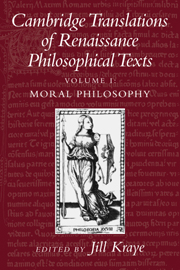Book contents
- Frontmatter
- Contents
- List of Translators
- Preface
- PART I CONCEPTS OF MAN
- 1 Anselm Turmeda
- 2 Poggio Bracciolini
- 3 Marsilio Ficino
- 4 Fernán Pérez de Oliva
- PART II ARISTOTELIAN ETHICS AND THE SUPREME GOOD
- PART III ARISTOTELIAN ETHICS AND CHRISTIANITY
- PART IV PLATONIC ETHICS
- PART V STOIC ETHICS
- PART VI EPICUREAN ETHICS
- Bibliography of Renaissance Moral Philosophy Texts Available in English
- Index Nominum
- Index Rerum
4 - Fernán Pérez de Oliva
Published online by Cambridge University Press: 05 June 2012
- Frontmatter
- Contents
- List of Translators
- Preface
- PART I CONCEPTS OF MAN
- 1 Anselm Turmeda
- 2 Poggio Bracciolini
- 3 Marsilio Ficino
- 4 Fernán Pérez de Oliva
- PART II ARISTOTELIAN ETHICS AND THE SUPREME GOOD
- PART III ARISTOTELIAN ETHICS AND CHRISTIANITY
- PART IV PLATONIC ETHICS
- PART V STOIC ETHICS
- PART VI EPICUREAN ETHICS
- Bibliography of Renaissance Moral Philosophy Texts Available in English
- Index Nominum
- Index Rerum
Summary
Introduction
Born around 1494 in Cordova, Fernán Pérez de Oliva began his studies at the age of fourteen in Salamanca and after three years attended the recently founded Complutensian University in Alcalá. In 1512 he left for Paris, and at the Sorbonne was the pupil of Juan Martínez Guijarro Siliceo. Three years later he was taken to Rome by an uncle who was in the service of Pope Leo X. In 1518 he went back to Spain but later returned to Paris, where he stayed for three years, studying Aristotle's Nicomachean Ethics among other works. In 1524 he returned once again to Spain, residing until 1526 in Cordova and then transferring to Salamanca. In 1529 he was elected rector of the University of Salamanca and, the next year, he obtained the chair of theology. He died on 3 August 1531.
Best known for his historical works on the discovery of America, Pérez de Oliva also produced (rather free) translations of the tragedies of Euripides, as well as treatises on scientific topics and moral philosophy. His Dialogue on the Dignity of Man purports to record an argument between two friends: Aurelio, who gives a relentlessly negative account of human life, and Antonio, who exalts man's dignity. The work needs to be seen within the context of what recent studies have identified as the particular flourishing of the dialogue in sixteenth century Spanish literature, though it has to be said that Pérez de Oliva's work is notably lacking in narrative movement and dramatic tension.
- Type
- Chapter
- Information
- Cambridge Translations of Renaissance Philosophical TextsMoral and Political Philosophy, pp. 37 - 44Publisher: Cambridge University PressPrint publication year: 1997



